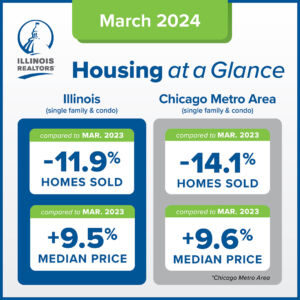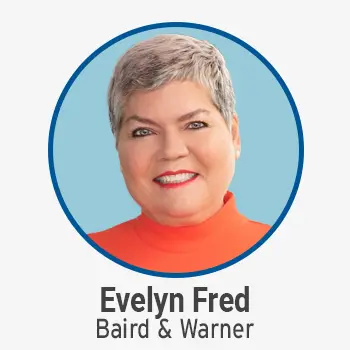Legal Hotline Top 4 for 2019
1. Advertising
Business Name Size Requirements
With the recent changes to the Real Estate License Act (“RELA”) going into effect on August 9, 2019, the changes to the Act caused a spike in advertising related questions. The hottest question in this area has been about the new language under Section 10-30(f) addressing size of the sponsoring broker’s name in relation to a team name or individual broker’s name. The requirement now is that the sponsoring broker’s name shall be at least equal in size or larger than the team name or that of the individual.
This language makes it very clear that a licensee cannot create advertising that gives the impression that either the licensee or team is the licensed sponsoring entity. Although this change may require many REALTORS® to make significant changes to their current advertising at some expense, it is important to recognize that the change has only clarified what was already required under the Section 10-30(a) of the Act. The Act already stated that “No advertising …shall be fraudulent, deceptive, inherently misleading or proven to be misleading in practice.” Arguably, signage which suggests that the individual or team is its own company would fall into those prohibited categories.
Anneliese Fierstos
Illinois REALTORS® Legal Hotline Attorney
2. License Law and Business Practices
Virtual Offices and Record Keeping
A majority of the Legal Hotline questions have focused on how the changes to RELA have impacted business practices for licensees. Of great interest to members has been the new provisions which allow licensees to establish virtual offices.
Section 5-45(d) in the Act has removed the definite office requirement, although it does still impose the conspicuous display of an identification sign on the outside of any physical office maintained by the sponsoring broker.
The Act requires a strict approach to record keeping and, in the case of electronic records, may require sponsoring brokers to make significant changes to their office security practices. The Act now specifically provides:
Any record required by this Act to be created or maintained shall be, in the case of a physical record, securely stored and accessible for inspection by the Department at the sponsoring broker’s principal office and, in the case of an electronic record, securely stored in the format in which it was originally generated, sent or received and accessible for inspection by the Department by secure electronic access to the record. Any record relating to a transaction of a special account shall be maintained for a minimum of 5 years, and any electronic record shall be backed up at least monthly.
Given the strict language of the new section requiring these security measures to be in place for electronic record keeping, it may be advisable for REALTORS® to seek professional assistance in setting up a record retention system.
3. Contracts
Contract Termination
Frequently, buyers’ agents are faced with questions from their buyer clients regarding terminating a contract after an inspection report has revealed a material defect in the property under contract or after an appraisal comes up short on the purchase price of the home. Often buyers and sellers can renegotiate any issues that occur during the inspection or appraisal process.
However, some buyers may try to use those types of circumstances to terminate a contract because they have simply changed their mind about the purchase of the home. In either case, there is a lot to consider in terminating a contract and the buyer’s agent should encourage the buyer to consult with their own legal counsel about the termination of the contract and potential ramifications in so doing. Legal counsel may be able to assist the buyer in identifying any contingencies in the contract which provide for termination under certain circumstances, and also advise the buyer about the potential risks of a breaching the contract.
4. License Law
Wholesaling
The addition of subparagraph (5) in Section 1-10 of the definition of the term “Broker” under the Act has brought the practice of wholesaling under the purview of the Illinois Department of Financial and Professional Regulation (“IDFPR”). Now, any individual or entity engaging in a pattern of business of buying, selling, offering to buy or sell, marketing for sale, exchanging or otherwise dealing in contracts, including assignable contracts for the purchase or sale of options on real estate or improvements thereon must be properly sponsored and registered with IDFPR. A pattern of business has been clarified to include engaging in one or more of these types of transactions on 2 or more occasions in any 12-month period.
The expansion of the scope of the Act to include wholesaling provides protection to consumers from investors who might take advantage of sellers who are often in a distressed financial situation. As a result of these changes, individuals who previously engaged in this practice outside of a brokerage will be required to become licensed and seek a sponsoring broker. Brokerages who choose to sponsor licensees engaged in this practice should consider reviewing and potentially redrafting office policies and educational materials to incorporate information on the disclosures which must be made to all parties in a wholesale transaction.
Licensees who engage in wholesaling (i.e. the systemic assignment of real estate contracts to match a seller with an end buyer), will now be required to disclose their status as a real estate license in writing to sellers. In addition, due to the prohibition against dual agency when a real estate licensee has an interest in the subject property, in this case as a “contract buyer”, the seller should receive a notice of no agency from the wholesaler who is representing his/her own interest. Then, when the wholesaler identifies the end buyer, or a person to whom the contract will be assigned, the wholesaler must disclose licensee status and provide a notice of no agency to the buyer, too.
About the writer: Anneliese Fierstos is the Illinois REALTORS® Legal Hotline Attorney.





 Create professional development programs that help REALTORS® strengthen their businesses.
Create professional development programs that help REALTORS® strengthen their businesses.
 Protect private property rights and promote the value of REALTORS®.
Protect private property rights and promote the value of REALTORS®.
 Advance ethics enforcement programs that increase REALTOR® professionalism.
Advance ethics enforcement programs that increase REALTOR® professionalism.
 Protect REALTORS® by providing legal guidance and education.
Protect REALTORS® by providing legal guidance and education. Stay current on industry issues with daily news from Illinois REALTORS®, network with other professionals, attend a seminar, and keep up with industry trends through events throughout the year.
Stay current on industry issues with daily news from Illinois REALTORS®, network with other professionals, attend a seminar, and keep up with industry trends through events throughout the year.


